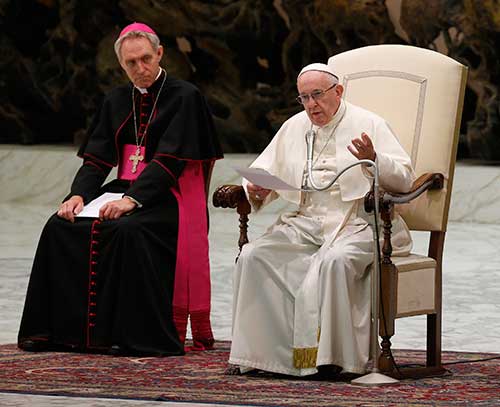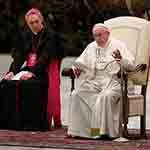
Pope Francis certainly stirred things up last week by changing the teaching in the Roman Catholic Catechism on the death penalty. It is now inadmissible in all situations.
Some saw it as a great distraction from Cardinal Theodore McCarrick bringing the RC Church into the headlines for all the wrong reasons. [Others had tried different distractions a few days earlier: Archbishop Paul Coakley blamed the scourge of the sexual abuse of minors and young people on the sexual revolution and on lay people not heeding Humanae Vitae and separating sexual intimacy in marriage from fertility. He also said the allegations of McCarrick remained under the radar because Church policy had not thought to include bishops as perpetrators!]
Others noted that if the RC Church can change its teaching on capital punishment, then other RC teachings might also change, eg. on sexual ethics: masturbation (“intrinsically and gravely disordered action” 2352), homosexual acts (intrinsically disordered 2357), homosexual tendencies (“objectively disordered” 2358), using contraception within marriage (“intrinsically evil” 2370).
[NB. that homosexual tendencies are “objectively disordered” was added in 1998. Prior to that the Catechism simply had, “They do not choose their condition; for most of them it is a trial”].
Also, there are RC teachings on celibacy of priests, ordination reserved to males, and those divorced and remarried receiving communion that are regularly being questioned. Pope Francis’ encyclical “Joy of Love” (Amoris Laetitia) opened the door to civilly married divorced Roman Catholics receiving Communion in a RC Mass.
Debates include discussions of levels of teaching authority within RC teaching. This soon strays into disagreement about what is infallible and what isn’t. An epistemological flaw with infallibility is that there is no infallible list of what has been infallibly declared 🙂
The Twitterverse, websites, and facebook were, soon after the announcement about the change in teaching on the death penalty, awash with criticism of Pope Francis. Those conservatives (and reactionaries) who had felt the Vatican II tide turning with Pope Benedict XVI had to change tack with their Roma locuta; causa finita est (“Rome has spoken; the case is closed”) approach when Pope Francis arrived. Many do not accept his papacy.
Interestingly, in the reaction to Francis’ change to the teaching on capital punishmen, John-Paul II was now often caught up in these anti-Pope-Francis denunciations because Pope Francis essentially only made the slightest of alterations to Pope John-Paul II’s teaching. John-Paul had capital punishment as nearly always inadmissible. Francis says, in today’s world it is now always inadmissible.
I think development of Christian teaching and practice from biblical times through to now is so obvious in so many areas that the onus is on those who hold to a static revelation to show that there has been no development whatsoever. I would argue that, in many areas, a trajectory can be discerned, and that it is in the trajectory that we may hope to find God’s will.
Examples: the place of women; attitudes to slavery; banking and interest;…
*****
Texts for comparison
THE ROMAN CATECHISM OF TRENT
Issued by Pope Pius V in 1566; in use until 1992
Execution of Criminals
Another kind of lawful slaying belongs to the civil authorities, to whom is entrusted power of life and death, by the legal and judicious exercise of which they punish the guilty and protect the innocent. The just use of this power, far from involving the crime of murder, is an act of paramount obedience to this Commandment which prohibits murder. The end of the Commandment is the preservation and security of human life. Now the punishments inflicted by the civil authority, which is the legitimate avenger of crime, naturally tend to this end, since they give security to life by repressing outrage and violence. Hence these words of David: In the morning I put to death all the wicked of the land, that I might cut off all the workers of iniquity from the city of the Lord.
CATECHISM OF THE CATHOLIC CHURCH 1992
Pope John Paul II, in the prologue, taught about this Catechism, “I declare it to be a sure norm for teaching the faith …”
2266. Preserving the common good of society requires rendering the aggressor unable to inflict harm. For this reason the traditional teaching of the Church has acknowledged as well-founded the right and duty of legitimate public authority to punish malefactors by means of penalties commensurate with the gravity of the crime, not excluding, in cases of extreme gravity, the death penalty.
2267. If bloodless means are sufficient to defend human lives against an aggressor and to protect public order and the safety of persons, public authority should limit itself to such means because they better correspond to the concrete conditions of the common good and are more in conformity to the dignity of the human person.
1997 REVISION TO THE CATECHISM OF THE CATHOLIC CHURCH
The earlier catechism having lasted over four centuries, this catechism, “a sure norm for teaching the faith”, was revised within five years.
2267. Assuming that the guilty party’s identity and responsibility have been fully determined, the traditional teaching of the Church does not exclude recourse to the death penalty, if this is the only possible way of effectively defending human lives against the unjust aggressor.
If, however, non-lethal means are sufficient to defend and protect people’s safety from the aggressor, authority will limit itself to such means, as these are more in keeping with the concrete conditions of the common good and more in conformity with the dignity of the human person. Today, in fact, as a consequence of the possibilities which the state has for effectively preventing crime, by rendering one who has committed an offense incapable of doing harm—without definitively taking away from him the possibility of redeeming himself—the cases in which the execution of the offender is an absolute necessity are very rare, if not practically non-existent.
2018 REVISION TO THE CATECHISM OF THE CATHOLIC CHURCH
2267. Recourse to the death penalty on the part of legitimate authority, following a fair trial, was long considered an appropriate response to the gravity of certain crimes and an acceptable, albeit extreme, means of safeguarding the common good.
Today, however, there is an increasing awareness that the dignity of the person is not lost even after the commission of very serious crimes. In addition, a new understanding has emerged of the significance of penal sanctions imposed by the state. Lastly, more effective systems of detention have been developed, which ensure the due protection of citizens but, at the same time, do not definitively deprive the guilty of the possibility of redemption.
Consequently, the church teaches, in the light of the Gospel, that “the death penalty is inadmissible because it is an attack on the inviolability and dignity of the person”, and she works with determination for its abolition worldwide.
*****
If you appreciated this post, consider liking the liturgy facebook page, and/or signing up for a not-very-often email, …




Thanks Bosco for a helpful post with citations neatly place in one location!
Having read some of the criticism of this decision (which, incidentally, I don’t agree with … the Nuremberg executions were not wrong etc) it had struck me that some of it amounts to “Rome dare not change one thing because everything might have to change” and some -in similar vein – amounts to “Rome can’t change this because that would impute faillibility to some far distant, or even closer Pope’s infallible teaching.”
Much simpler to admit either “We got it wrong (but without blame to our forbears – hindsight is easier than foresight)” or “Some things are contextual, and in a new context this is what we now believe.” Jesus himself took both approaches!
‘Enlightenment drips slow’ but I think in more contexts than this humanity needs move away from the ‘doublethink’ inherent in accepted social ‘norms’ and conditions.
Excellent explanative of the movement of The Church on the issue, and an excellent example of how enlightenment might occur.